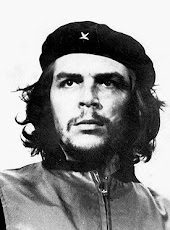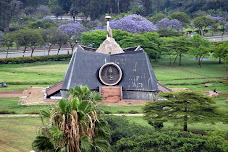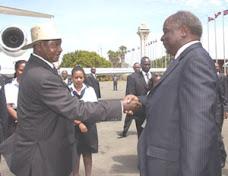The Government’s plan for containing the violence which has hit parts of the country following the disputed presidential elections became clearer Thursday with President Kibaki announcing he was ready for dialogue, and Attorney-General Amos Wako hinting at a formula for power-sharing.
President Kibaki said he was ready for dialogue as soon as “the violence stops and calm is restored for people to engage in constructive and productive talks.”
On his part, ODM leader Raila Odinga supported calls for dialogue. Mr Odinga made the remarks when he met South African Anglican Archbishop Desmond Tutu who arrived in Nairobi Thursday.
Mr Wako suggested that a way out can be found even without going to court. One of the ways to resolve the dispute, the AG said, is for a government of national unity to be formed.
Alternatively, an independent group agreeable to all sides could verify the presidential tallies, he said.
Mr Wako also warned that some of the crimes which had been committed border on genocide, — a crime punishable even through the international criminal justice system.
At the same time, three people died and a petrol station and five vehicles were set ablaze in Nairobi as groups of youths went on the rampage after police blocked an ODM rally called to protest against the results of the presidential election.
Groups of youths went on the rampage looting and burning property as they blocked sections of roads leading to Nairobi City centre.
President Kibaki, while addressing his first news conference since the violence started, assured Kenyans that the Government was doing everything possible to ensure security is maintained. Those who commit crime will face the full force of the law, said President Kibaki.
He promised to personally visit the affected areas soon to promote reconciliation and healing. Kenyans were free to settle and own property anywhere in the country, he added.
President Kibaki directed the Commissioner of Police to increase security hotlines for people to report any threats.
The President’s statement was made on the day demonstrations were also held in parts of Nairobi, Mombasa and Kisumu but these were largely peaceful. But in Kisumu, two MPs elect, Shakeel Shabir of Kisumu Town East and Olago Oluoch of Kisumu Town West all of ODM were being questioned by police after they addressed the protesting youths.
Police sources put the death toll from four days of violence at 185 while 155,711 people had been displaced. Majority of the displaced, 120,000 people, were reported to be in the Rift Valley where an operation to evacuate them to safer areas was under way.
Military escort
A convoy of 10 buses left Eldoret Town under military escort headed in the direction of Nakuru as police reported that 260 people had been arrested over the violence.
Calm returned to other major towns in Western Kenya such as Kakamega, Kisii, Bungoma and Busia even though police continued to patrol the streets.
The Electoral Commission of Kenya, meanwhile, gazetted the election of President Kibaki and 207 MPs. No gazettement of MPs was done for Kilgoris, Wajir North and Kamukunji where there were problems.
ODM leader Raila Odinga visited the Nairobi City Mortuary, Masaba hospital and Kibera slum, scene of some of the worst clashes between police and demonstrators. International mediation efforts gathered momentum with South African Anglican Bishop and Nobel prize laureate Desmond Tutu arriving in the country.
Archbishop Tutu held a two hour meeting with Mr Odinga and later said he was still trying to secure an appointment from President Kibaki’s side.
US Secretary of State Condoleezza Rice, EU Foreign chief Javier Solana and American Democratic Party presidential hopeful Barack Obama whose father was Kenyan, called for dialogue among the rival camps.
On Thursday, the ODM leaders called off the rally they had planned for Uhuru Park and announced they would gather at the same venue Friday.
Police managed to keep crowds away from the park by blocking routes leading into the city centre.
Uhuru Park itself was a no go zone with officers from the paramilitary General Service Unit and Administration Police placing a human ring around the grounds. Other teams of riot control police battled groups of rowdy youths in slum areas, confining them there.
There was destruction as rowdy youths held protest marches on Juja, Thika, Ngong and Outerring roads.
Also, two men were beaten unconscious and another seriously injured during the violent demonstrations.
Survivors who sustained deep cuts on the head were driven to hospital in Red Cross and St John’s ambulances after being saved by police.
Four fuel pumps were set on fire at the Agip petrol station on Juja road as well as four matatus and a car parked there.
City council Fire brigade rushed to the scene and fought the fire before it could spread and explode the under ground storage tanks. The protesters had lit the super, regular, diesel and kerosene fuel pumps.
Traffic was blocked for hours on Juja road before police managed to drive the protesters back to section 4A of the Mathare slums. The rowdy gangs had also lit huge fires and piled rocks on the road.
Across the valley, there were more skirmishes on Thika road as paramilitary police engaged a different group in running battles. The group clashed with the officers near Survey area after being blocked from walking to the city centre.
A man was killed at the spot after he came into contact with a drooping live electricity line.
He was among protesters, who had tried to force entry into a nearby Standard Chartered Bank branch.
Police guards at the bank fired in the air to prevent the surging crowd.
Traffic flow along the highway was interrupted occasionally but it was not disrupted for more than 30 minutes.
Earlier at dawn, two bodies had been found in Mathare and Dandora areas. At 9 am, other groups from the Kibera slums engaged police in similar battles on Ngong road.
Ordered closure
Following the violence, police headquarters ordered closure of Mbagathi Way, Uhuru Highway and Kenyatta Avenue, though the Government had pledged all roads would remain open.
On Ngong road, police and the protesters clashed near the Prestige Plaza. Several kiosks on the roadside were destroyed. Police pushed and managed to hold the crowd near the Kibera DO’s office.
At 2pm, other groups converged on Argwings Kodhek road, 200 metres from Orange House, the ODM headquarters.
A Kobil petrol station was vandalised by the mob that started throwing stones after being confronted by the police.
Meanwhile, the donor community asked Kenyan leaders to put aside their differences and re-solve the impasse. They said business had estimated that about Sh2 million per day was being lost.
In a joint statement World Bank, Canada, Denmark, the European Commission, France, Norway, Sweden, the United Kingdom and the United States warned that the gains made by Kenya in the last few years could dissipate due to the on-going destruction.
“At stake is the pre-election Gross Domestic Product (GDP) growth rate of seven percent, rising business confidence, increasing tourism, measurable progress in firm level productivity, significant gains in democratic development and the lifting of over two million Kenyans out of poverty over the last few years,” said the statement.
The donor community said at the Nairobi Stock Exchange, Sh40 billion (about five percent of market capitalisation) was wiped off the value of shares when the market resumed business after the elections, hurting investors large and small.
Friday, January 4, 2008
Subscribe to:
Post Comments (Atom)






















No comments:
Post a Comment